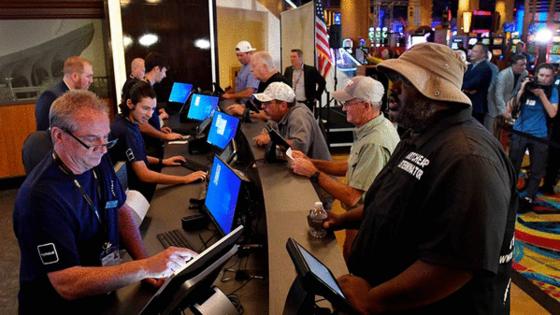Missouri will soon vote on legalizing sports gambling. What to know about Amendment 2
Published in News & Features
KANSAS CITY, Mo. — In the Nov. 5 election, Missouri voters will decide if they want to legalize sports gambling in the state when they vote on Amendment 2.
The Show Me State is one of 12 states left where the practice is prohibited.
Retail and/or online sports betting is legal in nearly every neighboring state — Kansas, Illinois, Arkansas, Kentucky, Tennessee, Iowa and Nebraska.
Legal sports gambling made it to the 2024 ballot after years of failed legislation in Jefferson City. The delays were caused by legislators’ ongoing debate over regulating video lottery terminals — slot machine-like games in gas stations and truck stops that exist in a legal gray area. Amendment 2 does not address video lottery terminals.
In May, a pro-sports gambling coalition submitted 340,000 signatures to get a constitutional amendment on the ballot, with language written by the organization.
The campaign, called Winning for Missouri Education, is backed by all major Missouri professional teams — including the Kansas City Chiefs, Royals and Current — and received large donations from mobile sports betting operators FanDuel and DraftKings.
Amendment 2 is one of six Missouri ballot measures appearing in the November general election, including measures on abortion, minimum wage and riverboat casinos.
Here is an overview about Missouri’s Amendment 2.
What does my vote on Amendment 2 mean?
Voting “yes” would allow people in Missouri over the age of 21 to place bets on professional and collegiate sports games in casinos and online starting in December 2025 at the latest. The state of Missouri would impose a 10% tax on sports betting, with the first $5 million allocated to a fund intended to help prevent compulsive gambling. The remaining money would go to K-12 schools and higher education.
Voting “no” would keep Missouri sports betting laws the same as they have been since the 1990s, prohibiting state-sanctioned sports gambling.
How much money would legal sports gambling bring to the Missouri government?
Supporters and opponents disagree on how many tax dollars sports betting could bring to Missouri. The ballot language states that tax revenue could range from $0 to $28.9 million, according to an analysis by the Missouri State Auditor’s Office, an independent watchdog agency.
A report commissioned by the pro-sports betting campaign stated $105 million could go to Missouri education in the first five years of legal sports gambling.
Both the Missouri Department of Revenue and Gambling Commission said in the fiscal note they did not anticipate the gambling operators will pay any gaming taxes, because of the deductions they could claim for the cost of free play and promotional credits.
Winning for Missouri Education has refuted those estimates, pointing to a 25% cap on deductions included in the amendment.
What are the arguments against Amendment 2?
The Missouri AFL-CIO, a federation of unions that represents teachers and casino workers, among other industries, advised its members to vote no on the amendment.
Jason Roberts, the president of the Kansas City teachers union, AFT 691, said he thinks that the pro-sports gambling organization is “making promises that can’t be fulfilled,” in advertising education funding. Roberts also takes issue with teachers being “politicized” and used as a “scapegoat” in the campaign.
He said that proponents “are saying, if you vote for this, we’re going to make (teachers’) lives better, but the state auditor and tax commission say that’s not likely to happen.”
In addition, a growing number of academic studies suggest that sports betting is worse for household finances than other types of gambling and the accessible online format helps fuel gambling addictions.
What are the arguments for Amendment 2?
Jack Cardetti, spokesperson for Winning for Missouri Education, said that the Show Me State is missing out on tax dollars when gamblers travel out of state to bet on games. Cardetti said the problem with Kansas’ legal sports betting is that they did not have a cap on deductions, while Missouri’s amendment has a 25% cap.
What resources are available to help with gambling addictions?
Those with gambling problems and their loved ones can call 888-238-7633. Information on resources like free counseling and Gamblers Anonymous can be found on the Missouri Department of Mental Health’s website.
How will Amendment 2 appear on the ballot?
Do you want to amend the Missouri Constitution to:
•allow the Missouri Gaming Commission to regulate licensed sports wagering including online sports betting, gambling boats, professional sports betting districts and mobile licenses to sports betting operators;
•restrict sports betting to individuals physically located in the state and over the age of 21;
•allow license fees prescribed by the Commission and a 10% wagering tax on revenues received to be appropriated for education after expenses incurred by the Commission and required funding of the Compulsive Gambling Prevention Fund; and
•allow for the general assembly to enact laws consistent with this amendment?
State governmental entities estimate onetime costs of $660,000, ongoing annual costs of at least $5.2 million, and initial license fee revenue of $11.75 million. Because the proposal allows for deductions against sports gaming revenues, they estimate unknown tax revenue ranging from $0 to $28.9 million annually. Local governments estimate unknown revenue.
Fair Ballot Language:
A “yes” vote will amend the Missouri Constitution to permit licensed sports wagering regulated by the Missouri Gaming Commission and restrict sports betting to individuals physically located in the state and over the age of 21. The amendment includes a 10% wagering tax on revenues received to be appropriated for educational institutions in Missouri.
A “no” vote will not amend the Missouri Constitution regarding licensed regulated sports wagering.
If passed, this measure will have no impact on taxes.
---------
(The Star’s Kacen Bayless contributed to this report.)
---------
©2024 The Kansas City Star. Visit at kansascity.com. Distributed by Tribune Content Agency, LLC.







Comments